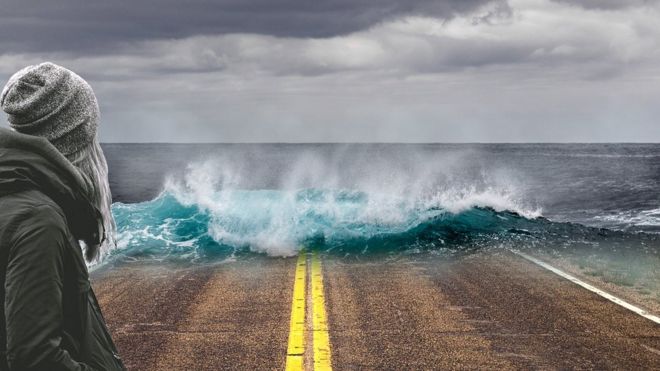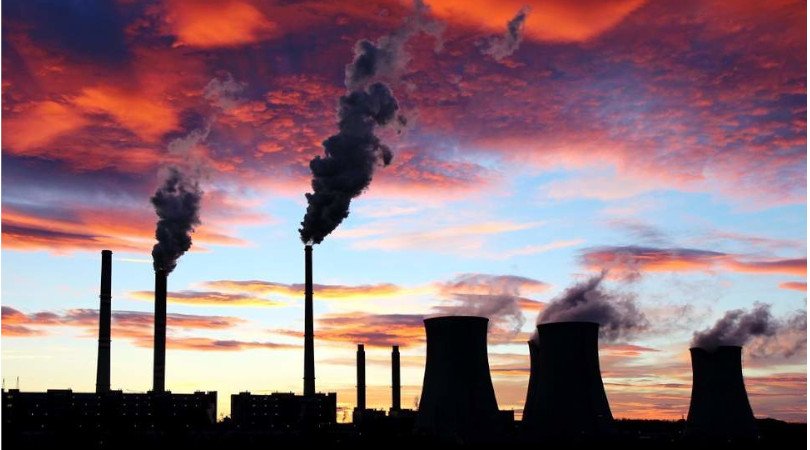Aberto período para inscrição para participação da primeira minuta da contribuição do Grupo de Trabalho I para o Sexto Relatório de Avaliação (AR6), do IPCC
 IPCC - Revisão por especialistas da primeira minuta da contribuição do Grupo de Trabalho I para o Sexto Relatório de Avaliação (AR6).
IPCC - Revisão por especialistas da primeira minuta da contribuição do Grupo de Trabalho I para o Sexto Relatório de Avaliação (AR6).
O IPCC deu Início ao processo de revisão por especialistas da primeira minuta da contribuição do Grupo de Trabalho I para o Sexto Relatório de Avaliação (AR6), a qual estará disponível para análise até 23 de junho de 2019, às 23:59 (GMT +2).
Os especialistas interessados deverão registrar-se diretamente no site do Secretariado do IPCC:
https://apps.ipcc.ch/comments/ar6wg1/fod/register.php.
Como nosso cérebro atrapalha o combate às mudanças climáticas
 Sabemos que o aquecimento global está acontecendo. É consenso também que as mudanças climáticas são resultado do aumento das emissões de carbono pelas atividades humanas, como a degradação da terra e a queima de combustíveis fósseis. Por fim, sabemos que precisamos de uma solução urgente.
Sabemos que o aquecimento global está acontecendo. É consenso também que as mudanças climáticas são resultado do aumento das emissões de carbono pelas atividades humanas, como a degradação da terra e a queima de combustíveis fósseis. Por fim, sabemos que precisamos de uma solução urgente.
Um recente relatório internacional de especialistas em clima alerta que a Terra deve registrar um aquecimento médio de 1,5°C nos próximos 11 anos.
Quando isso finalmente ocorrer, podemos esperar um "aumento dos riscos para a saúde, meios de subsistência, segurança alimentar, abastecimento de água, segurança humana e crescimento econômico".
Leia completo em BBC.
12 excuses for climate inaction and how to refute them
:format(webp)/cdn.vox-cdn.com/uploads/chorus_image/image/63847855/burning-earth.0.jpg) There’s a reason why the 16-year-old Swedish climate activist Greta Thunberg has successfully goaded powerful politicians into long-overdue climate action in just six months.
There’s a reason why the 16-year-old Swedish climate activist Greta Thunberg has successfully goaded powerful politicians into long-overdue climate action in just six months.
Thunberg, who is on the autism spectrum, has become a moral authority. Again and again, she’s clearly articulated how adults have shamefully abdicated their basic duties to protect today’s children and future generations from compounding climate catastrophe. “This ongoing irresponsible behavior will no doubt be remembered in history as one of the greatest failures of humankind,” she told the British Parliament.
“You only talk about moving forward with the same bad ideas that got us into this mess, even when the only sensible thing to do is pull the emergency brake. You are not mature enough to tell it like is. Even that burden you leave to us children,” she declared at the United Nations.
Her ability to sway politicians and the public, in speeches and through the school strike movement, is now evident: European leaders have called for aggressive new carbon emissions reductions, citing her movement.
Fortunately, Thunberg is just one of many great minds helping us summon moral clarity to address the tricky problem of framing the climate crisis. That includes the writers David Wallace-Wells, George Monbiot, and Anand Giridharadas; the historian Jill Lepore; and Rep. Alexandria Ocasio-Cortez (D-NY), among many others.
Read complete at Vox
Uma concentração de CO2 nunca vista pela espécie humana.
 Na semana passada, comentamos o novo recorde da concentração de dióxido de carbono na atmosfera. Havíamos passado dos 415 ppm.
Na semana passada, comentamos o novo recorde da concentração de dióxido de carbono na atmosfera. Havíamos passado dos 415 ppm.
Mas faltou dizer, como o fez o meteorologista Eric Holthouse, que a espécie humana, ao longo dos milhões de anos de sua história, jamais viveu numa atmosfera como essa.
ClimaInfo, 15 de maio de 2019.
Leia em Clima Info.
Mais itens...
- Bairro em Londres vai criar 11km de corredor de flores para abelhas
- It's Official: Atmospheric CO2 Just Exceeded 415 ppm For The First Time in Human History
- Carbon dioxide levels hit landmark at 415 ppm, highest in human history
- Mudanças climáticas no Rio e no mundo: a urgência de novos padrões
- Derretimento da Antártica já está seis vezes mais rápido do que há 40 anos
- O colapso da Terra está cada vez mais próximo
- ONU alerta contra impactos ambientais da dessalinização para fornecimento de água doce
- 1 milhão de espécies ameaçadas: o que diz preocupante relatório da ONU sobre impacto humano
- São Paulo está quente demais para maio
- Como a mudança climática está deixando os países ricos mais ricos, e os pobres mais pobres
- Permafrost collapse is accelerating carbon release
- Nasa instrument heads to space station to map CO2
- Agência norte-americana avisa comunidades para que se prepararem para a mudança do clima
- Parlamento britânico é o primeiro do mundo a declarar “emergência ambiental e climática”
- Entrevista do Mês: Eduardo Assad
- Cientistas discutem devastador custo da ação humana no planeta
- Novo ciclone atinge Moçambique seis semanas após o primeiro; ONU pede mais apoio
- NASA revela novas (e preocupantes) evidências do aquecimento global
- As chuvas extremas do Rio são a nova normalidade do clima?
- Temporais fazem parte de uma nova realidade, diz climatologista
- Motivo de caos no Rio, chuva anormal para outono é 'retrato de clima mais hostil'
- Humanidade consome recursos da Terra a taxas insustentáveis, alerta agência da ONU
- A diferença entre os impactos de um aquecimento de 1,5˚C ou 2˚C no planeta
- Emissões de carbono quebram o recorde em um retrocesso global devastador
- Demanda por energia dispara em 2018 e emissões batem recorde
- Situação do clima em 2018 mostrou aumento dos efeitos da mudança climática, diz relatório
- Reflexos do aquecimento global para a economia brasileira
- Falta de acesso à água afeta bilhões e provoca aumento de conflitos no mundo, diz relatório da ONU
- Terceiro Relatório de Atualização Bienal do Brasil
- Convite: Lançamento do Livro – Brasil: um futuro sustentável
- Artigo: A felicidade traz prosperidade
- Rio de Janeiro registra as temperaturas médias mais altas em 97 anos
- Biodiversidade é uma potência ainda subaproveitada no país.
- ‘Estresse térmico’ deixa pessoas mais nervosas nos dias quentes
- Groenlândia está derretendo mais rápido do que esperávamos e não há muito mais o que fazer
- Verão pode causar 'estresse térmico' no corpo
- Gelo da Antártica está derretendo seis vezes mais rápido do que há 40 anos, diz estudo
- 'A proteção do meio ambiente não pertence a nenhuma corrente política ou ideológica'
- Aquecimento dos oceanos ocorre em ritmo mais rápido que o esperado
- Verão tem temperaturas mais altas que as do ano passado; tendência é esquentar
- Agro holandês é POP
- Animais silvestres em perigo: projeto de lei libera caça no Brasil, também em unidades de conservação. E muito mais!
- Chuvas torrenciais e muito calor: o que determina o clima das grandes cidades?
- Verão de 2019 vai ser escaldante e já sabemos qual mês será o pior
- Ministério do Meio Ambiente oferece 8 cursos na área socioambiental
- Agenda do Evento de Lançamento do Relatório "Potência Ambiental da Biodiversidade: um caminho inovador para o Brasil"
- COP 24 aprova 'livro de regras' do Acordo de Paris
- Relatório encomendado pela própria UNFCCC sobre o aquecimento
- Secretário-geral da ONU alerta que planeta não pode se permitir fracassar na COP 24
- Brasil perderá se sair do acordo climático, diz ex-negociador dos EUA
- 1. SBPC se manifesta contra a saída do Brasil do Acordo de Paris
- A COP24 em Katowice terminou neste domingo, por volta das 00:30h.
- Artigo: Capitalismo climático Para a obtenção do lucro, é fundamental que se limite o aumento de temperatura da Terra
- Painel Brasileiro de Mudanças Climáticas e a Fundação Grupo Boticário lançam Sumário para Tomadores de Decisão sobre biodiversidade e clima na COP24
- Relatório Especial “Potência Ambiental da Biodiversidade: um caminho inovador para o Brasil”
- 1º Fórum Brasileiro de Transição Energética
- Evento de Lançamento do Sumário para Tomadores de Decisão (STD) do PBMC e BPBES – Espaço Brasil na COP-24
- COP24 "Eles chegaram a Katowice de bicicleta"
- Como anda a COP14 da Biodiversidade?
- Moving for Climate NOW
- 2018 UN Biodiversity Conference
- Primeira chuva no Atacama em 500 anos destrói vários micróbios
- Temperatura do planeta poderá aumentar 3,2 graus Celsius, muito além da meta de 1,5
- Biodiversidade é 'galinha de ovos de ouro' desperdiçada no Brasil, mostra relatório
- Impacto das mudanças climáticas intensificam incêndios na Califórnia
- Biodiversidade não é problema, é solução
- BRASIL pode ser líder em desenvolvimento sustentável, dizem cientistas
- Aquecimento climático em São Paulo já é o dobro da meta global
- Não é só pelo 1,5ºC
- Chamada pública "Boas práticas de sustentabilidade A3P"
- Ministro divulga nota sobre fusão com o MAPA
- Fome: aquecimento aumenta o risco de uma nova grande crise global
- Populações de animais caíram 60% em 44 anos, alerta WWF
- Anúncio da fusão dos ministérios da Agricultura e Meio Ambiente preocupa a Coalizão Brasil
- Remote Hawaiian Island Wiped Off The Map
- Dados do Inpe sugerem aceleração da área desmatada na Amazônia
- O que precisa ser feito em cada setor para limitar o aquecimento global em 1,5oC?
- 1,5°C a mais até o fim do século - otimismo possível?
- O Brasil e a biodiversidade
- Aquecimento global está acima da meta, diz IPCC
- Análise: Relatório do IPCC força aquecimento global sobre agenda dos candidatos a presidente
- ONU dá último alerta para evitar a catástrofe climática
- Educação ambiental abre 16 mil vagas
- 37 things you need to know about 1.5C global warming
- We have 12 years to limit climate change catastrophe, warns UN
- Leaked US critique of climate report sets stage for political showdown in Korea
- Aquecimento global pode modificar eixo de rotação da Terra, aponta estudo da Nasa.
- Mobilidade elétrica na cidade: Veículos Coletivos e de Carga
- Aquecimento eleva risco de desertificação no Nordeste
- DERRETIMENTO DO PERMAFROST ESGOTA O ORÇAMENTO DE CARBONO ANTES DO PREVISTO
- Ações para reduzir emissões na agricultura ainda não são suficientes Este trecho é parte de conteúdo que pode ser compartilhado utilizando o link https://www.valor.com.br/agro/5852317/acoes-para-reduzir-emissoes-na-agricultura-ainda-nao-sao-suficientes o
- IV ENPJA ocorre em setembro
- Abordagens metodológicas para análise de Vulnerabilidades à Mudanças Climáticas
- A Cidade Universitária e o Consumo de Energia - Hoje
- Marcha pelo clima reúne mais de 30 mil pessoas nos EUA.
- Mobilização global ‘Una-se pelo clima’ realiza ações em mais de 90 países
- Navio bate em ponte e aeroporto fica isolado na passagem do Tufão Jebi no Japão
- NASA Discovers Bubbling Lakes In The Remote Arctic - A Sign Of Global Warming
- Elevação das concentrações de carbono na atmosfera ameaça a nutrição humana
- O aquecimento global já é realidade. E agora?
















